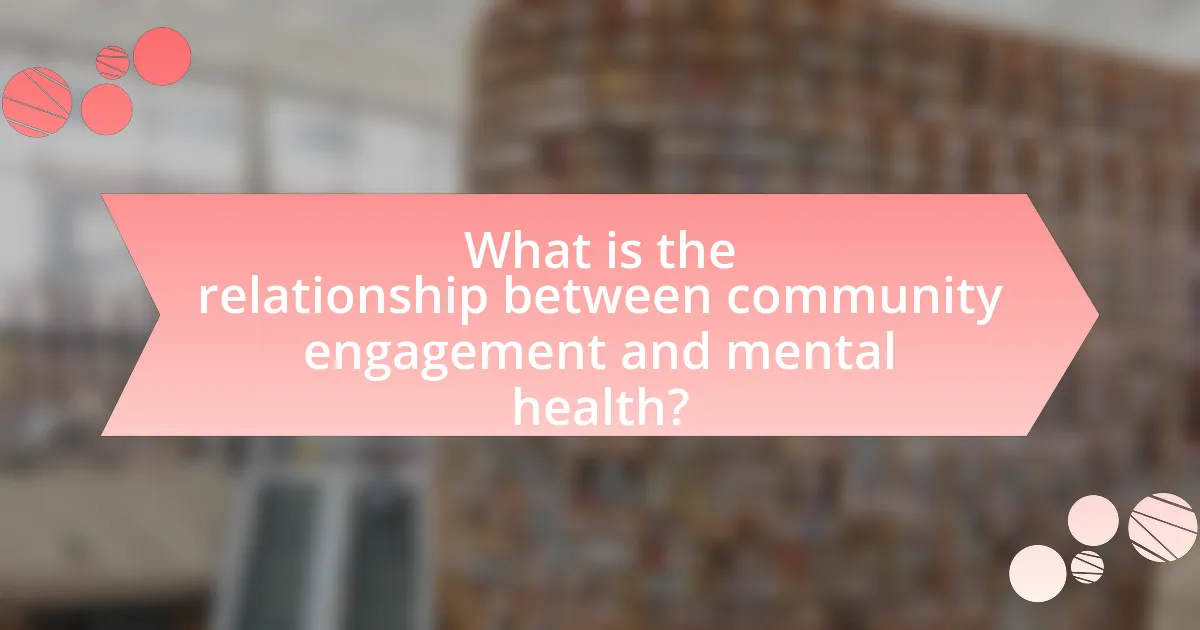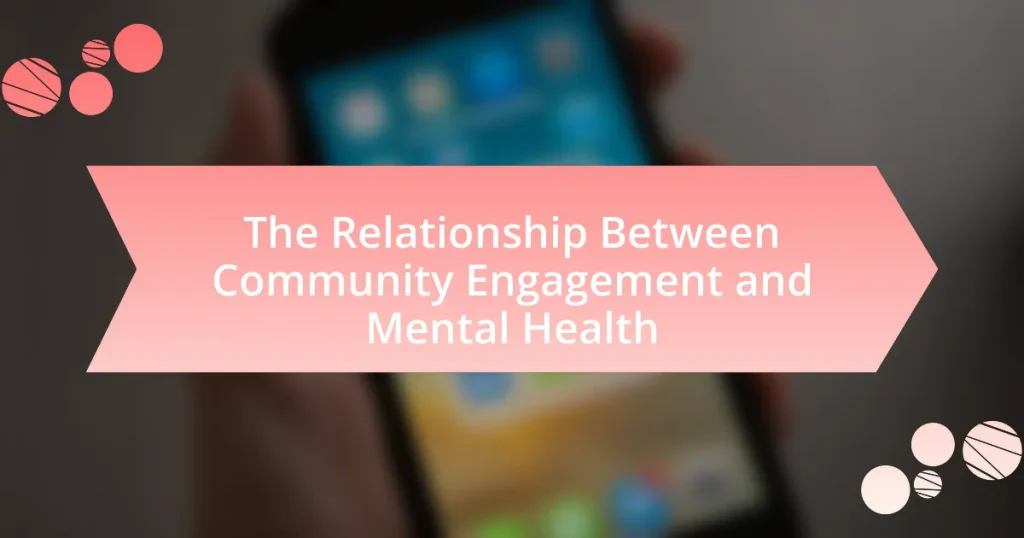The article examines the relationship between community engagement and mental health, highlighting how active participation in community activities fosters social connections and support networks that enhance mental well-being. It discusses the positive impact of community involvement on reducing depression and anxiety, as evidenced by various studies linking engagement to improved psychological health and life satisfaction. Key factors influencing this relationship include social support, access to resources, and participation in community events. The article also addresses challenges to fostering community engagement, such as stigma and resource limitations, while proposing strategies to enhance participation and promote mental health through inclusive community initiatives.

What is the relationship between community engagement and mental health?
Community engagement positively influences mental health by fostering social connections and support networks. Engaging with community activities enhances feelings of belonging and reduces isolation, which are critical factors in mental well-being. Research indicates that individuals who participate in community service report lower levels of depression and anxiety. For instance, a study published in the Journal of Community Psychology found that community involvement is linked to improved psychological well-being and life satisfaction. This evidence underscores the significant role that community engagement plays in promoting mental health.
How does community engagement influence mental health outcomes?
Community engagement positively influences mental health outcomes by fostering social connections and providing support networks. Research indicates that individuals who actively participate in community activities report lower levels of depression and anxiety. For instance, a study published in the American Journal of Public Health found that community involvement is associated with improved psychological well-being, as it enhances feelings of belonging and purpose. Additionally, engaged individuals often have better access to resources and support systems, which can mitigate stress and promote resilience.
What are the key factors in community engagement that affect mental health?
Key factors in community engagement that affect mental health include social support, participation in community activities, and access to resources. Social support from community members fosters a sense of belonging and reduces feelings of isolation, which is crucial for mental well-being. Participation in community activities enhances social connections and provides opportunities for individuals to engage meaningfully, contributing to improved mental health outcomes. Access to resources, such as mental health services and recreational facilities, directly influences individuals’ ability to maintain their mental health. Research indicates that communities with strong social networks and active engagement show lower rates of mental health issues, highlighting the importance of these factors in promoting mental well-being.
How do different forms of community engagement impact mental well-being?
Different forms of community engagement positively impact mental well-being by fostering social connections, enhancing a sense of belonging, and reducing feelings of isolation. Research indicates that individuals who participate in community activities, such as volunteering or joining local organizations, report lower levels of depression and anxiety. For instance, a study published in the Journal of Community Psychology found that community involvement significantly correlates with improved mental health outcomes, as it provides emotional support and strengthens social networks. Additionally, engaging in community service has been linked to increased life satisfaction and a greater sense of purpose, further contributing to overall mental well-being.
Why is community engagement important for mental health?
Community engagement is important for mental health because it fosters social connections and support systems that enhance individual well-being. Research indicates that individuals who actively participate in their communities experience lower levels of depression and anxiety, as social interactions can provide emotional support and a sense of belonging. A study published in the American Journal of Public Health found that community involvement is linked to improved mental health outcomes, highlighting that people engaged in community activities report higher life satisfaction and lower stress levels.
What evidence supports the link between community engagement and improved mental health?
Community engagement significantly correlates with improved mental health, as evidenced by various studies. Research published in the Journal of Community Psychology indicates that individuals who participate in community activities report lower levels of depression and anxiety. Specifically, a study by Holt-Lunstad et al. (2010) found that social connections, fostered through community involvement, can reduce mortality risk and enhance psychological well-being. Additionally, a meta-analysis by Choi and Lee (2017) demonstrated that community engagement leads to increased life satisfaction and emotional resilience, highlighting the protective effects of social support networks on mental health. These findings collectively affirm the positive impact of community engagement on mental health outcomes.
How does social support from community engagement contribute to mental health?
Social support from community engagement significantly enhances mental health by providing individuals with a sense of belonging and emotional resources. Engaging with community members fosters social connections, which are crucial for reducing feelings of isolation and loneliness, both of which are linked to mental health issues. Research indicates that individuals who actively participate in community activities report lower levels of depression and anxiety. For instance, a study published in the Journal of Community Psychology found that community involvement is associated with improved psychological well-being, as it promotes social networks and support systems that individuals can rely on during challenging times.
What challenges exist in fostering community engagement for mental health?
Challenges in fostering community engagement for mental health include stigma, lack of awareness, and resource limitations. Stigma surrounding mental health often prevents individuals from seeking help or participating in community initiatives, as they fear judgment or discrimination. Additionally, a lack of awareness about mental health issues and available resources can hinder community involvement, as people may not understand the importance of engagement or how to contribute effectively. Resource limitations, such as insufficient funding and trained personnel, further complicate efforts to create and sustain community programs aimed at mental health support. These factors collectively create barriers that impede effective community engagement in mental health initiatives.
What barriers prevent individuals from engaging with their communities?
Barriers that prevent individuals from engaging with their communities include lack of time, social anxiety, and limited access to resources. Lack of time often arises from work commitments and family responsibilities, making it difficult for individuals to participate in community activities. Social anxiety can deter individuals from engaging due to fear of judgment or negative experiences in social settings. Limited access to resources, such as transportation or information about community events, further restricts participation. According to a study published in the Journal of Community Psychology, these barriers significantly impact community engagement levels, highlighting the need for targeted interventions to promote participation.
How can communities overcome these challenges to enhance mental health?
Communities can overcome challenges to enhance mental health by fostering inclusive support networks and promoting mental health awareness. By creating safe spaces for dialogue and providing access to mental health resources, communities can reduce stigma and encourage individuals to seek help. Research indicates that community engagement initiatives, such as peer support groups and mental health education programs, significantly improve mental well-being. For example, a study published in the Journal of Community Psychology found that communities with active mental health programs reported a 30% decrease in anxiety and depression rates among participants. This evidence underscores the effectiveness of community-driven approaches in enhancing mental health outcomes.
How can community engagement be effectively promoted to support mental health?
Community engagement can be effectively promoted to support mental health by implementing structured programs that foster social connections and provide accessible mental health resources. Research indicates that community-based interventions, such as peer support groups and mental health awareness campaigns, significantly enhance social cohesion and reduce stigma associated with mental health issues. For instance, a study published in the Journal of Community Psychology found that communities with active engagement initiatives reported a 20% decrease in mental health-related crises among participants. By prioritizing inclusive activities and ensuring that mental health services are readily available, communities can create supportive environments that encourage individuals to seek help and connect with others.
What specific strategies can communities implement to enhance engagement?
Communities can enhance engagement by implementing strategies such as organizing regular community events, fostering inclusive decision-making processes, and utilizing digital platforms for communication. Regular community events, like festivals or workshops, create opportunities for residents to connect and collaborate, which has been shown to improve social cohesion and mental well-being. Inclusive decision-making processes, where community members actively participate in planning and governance, empower individuals and increase their investment in community outcomes. Additionally, leveraging digital platforms for communication allows for broader outreach and engagement, particularly among younger demographics, facilitating information sharing and community involvement. These strategies collectively contribute to a more engaged community, which is linked to improved mental health outcomes, as evidenced by studies indicating that social support and community ties are protective factors against mental health issues.
How can technology facilitate community engagement for mental health?
Technology can facilitate community engagement for mental health by providing platforms for communication, support, and resource sharing. Digital tools such as social media, mobile applications, and online forums enable individuals to connect with others who share similar experiences, fostering a sense of belonging and reducing feelings of isolation. For instance, a study published in the Journal of Medical Internet Research found that online support groups significantly improve mental health outcomes by enhancing social support and reducing stigma. Additionally, technology can offer access to mental health resources, such as teletherapy and educational content, making it easier for community members to seek help and engage with mental health initiatives.
What role do local organizations play in promoting community engagement?
Local organizations play a crucial role in promoting community engagement by facilitating connections among residents and providing platforms for participation. These organizations often organize events, workshops, and volunteer opportunities that encourage individuals to interact, share experiences, and collaborate on community issues. For instance, studies have shown that communities with active local organizations report higher levels of civic participation and social cohesion, which are essential for mental well-being. Research from the National Institute of Mental Health indicates that community engagement can lead to improved mental health outcomes, as individuals feel a sense of belonging and support through their involvement in local initiatives.
What are the best practices for individuals to engage with their communities for better mental health?
Individuals can enhance their mental health by actively participating in community engagement activities. Best practices include volunteering for local organizations, joining community groups or clubs, and attending local events, which foster social connections and a sense of belonging. Research indicates that community involvement can reduce feelings of isolation and depression; for instance, a study published in the Journal of Community Psychology found that individuals who volunteer report higher levels of life satisfaction and lower levels of depression. Additionally, engaging in community service can provide a sense of purpose, which is crucial for mental well-being, as highlighted by the Mental Health Foundation, which states that helping others can improve one’s own mental health.
